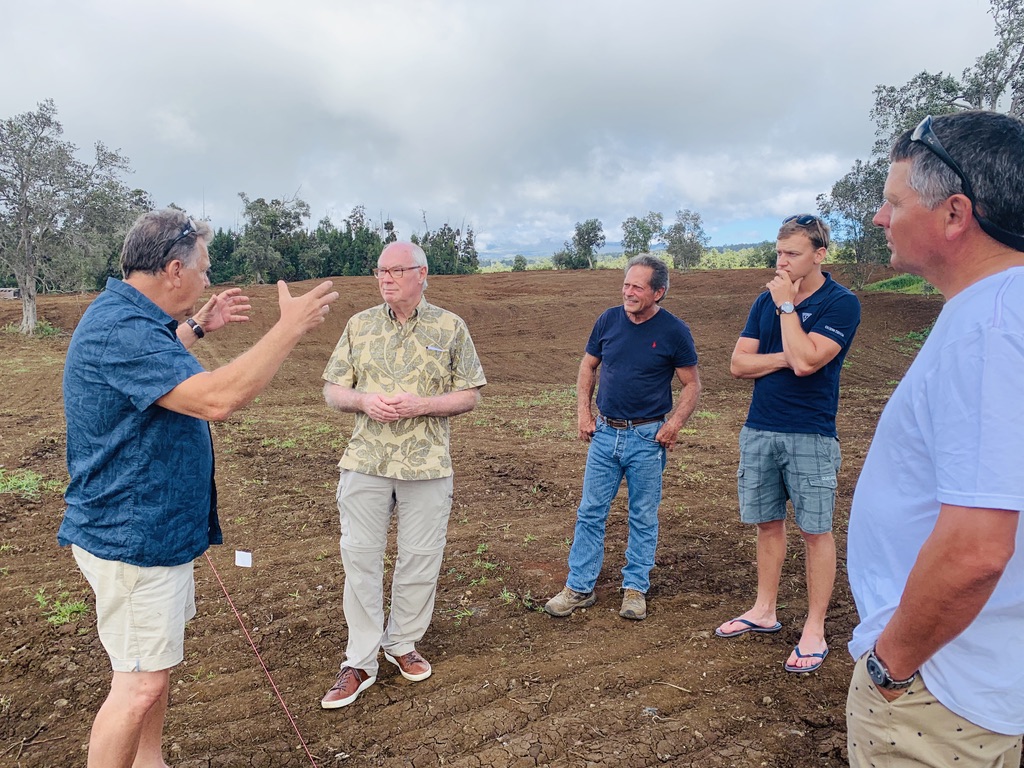 Project Lemon Tree advisors met in Kona, Hawai’i at Hokukano Ranch where a 5 acre site has been prepared for a research project to study and determine best practices for how to optimize organic lemon tree growing in orchards at agricultural scale. Present were Tom Pace (Hokukano owner), Gill Berger (First Foundation Bank Advisor and Bizgenics Foundation Advisor), Steve Sue (Bizgenics Foundation and Project Lemon Tree founder) and Paul Marais and team (managing director of SOGA Organic, the South African organic citrus growers association).
Project Lemon Tree advisors met in Kona, Hawai’i at Hokukano Ranch where a 5 acre site has been prepared for a research project to study and determine best practices for how to optimize organic lemon tree growing in orchards at agricultural scale. Present were Tom Pace (Hokukano owner), Gill Berger (First Foundation Bank Advisor and Bizgenics Foundation Advisor), Steve Sue (Bizgenics Foundation and Project Lemon Tree founder) and Paul Marais and team (managing director of SOGA Organic, the South African organic citrus growers association).
We are very thankful that the SOGA team took the time (and 26 hours of flight time) to make the trip from South Africa to share leading-edge secrets on how to grow organic lemons at scale. For the past 18 years, SOGA has been a leader in global organic citrus production. Over two weeks, the team looked deeply into Hawaii’s conditions for growing citrus as well as directing site preparations and laying out a 5-acre test site.
A 5-Acre Research Project
 Project Lemon Tree is excited to join forces with Hokukano Ranch and SOGA Organics in this research project to determine best-practices for organic lemon orchard production. We see this project as important to advising on our school orchard programs as well as championing a new agricultural economic development initiative for Hawaii-grown lemons and limes. This research project is designed to define best-growing practices for Hawai’i citrus in a small experiment before large acreage is installed. SOGA has a specific planting and testing protocol that has been used for over a decade to determine best practices. Over the next 3 years, the goal is to dial in optimal recipes and identify key variables that are most relevant to Hawai’i growing. Following this first phase project, hundreds of acres both at Hokukano and other partner ranches will be installed.
Project Lemon Tree is excited to join forces with Hokukano Ranch and SOGA Organics in this research project to determine best-practices for organic lemon orchard production. We see this project as important to advising on our school orchard programs as well as championing a new agricultural economic development initiative for Hawaii-grown lemons and limes. This research project is designed to define best-growing practices for Hawai’i citrus in a small experiment before large acreage is installed. SOGA has a specific planting and testing protocol that has been used for over a decade to determine best practices. Over the next 3 years, the goal is to dial in optimal recipes and identify key variables that are most relevant to Hawai’i growing. Following this first phase project, hundreds of acres both at Hokukano and other partner ranches will be installed.
Hawaii Deemed a Best Site for Lemons
The SOGA team was extremely excited with the Hokukano site as a premiere site to grow citrus. They spent time studying surrounding plants for insects, disease and fungi as well as soils, wind shear, water supply and other conditions. The bottom line for SOGA was that the site was one of the best that they have ever seen commenting that the site being amazingly clean, protected and well-suited to lemon production.
A Hawai’i Bill to Make Lemons 100% Locally-Sustainable
Phase 2 of this program is to work with a number of partnering ranches to meet with demand for 100% of Hawaii’s whole lemon demand. The College of Tropical Agriculture and Human Resources (CTAHR) at the University of Hawai’i at Manoa, estimates Hawai’i whole lemon demand at 4.2M lbs/year. This equates to 200-250 acres of lemon tree orchards. SOGA recommended strongly that we work with our state legislature to make our region 100% self-sustaining by creating a local law to outlaw importation of whole fruit as soon as possible. The rationale for this is that Hawai’i is one of the few places on the plant that has not been infected by the citrus green virus HLB, so it’s important to both Hawai’i and the world supply of lemons. This also applies to other citrus like limes.
The Business of Citrus & How to ROI
Phase 3 of this project is to produce lemons and limes beyond local demand for export. Lemons and limes on the mainland US are in peril with mainland supply chains decimated by the HLB virus. Mexico, Florida, Texas and California trees are all within HLB areas now. For example, Florida has lost 70% of all citrus trees in the past 3 years and the rest will die within the next 3 years. Distribution plans are already in the works to export lemons and limes to big box buyers via return route cold shipping routes that are currently shipping cool cases back to the mainland empty. This distribution chain is a fallow opportunity that can help make this new industry a highly profitable agricultural option for Hawai’i.
High-Regulation & Legal Designations for Global Markets

Sessions included deep discussions on organic growing methods, legal designation, regulation and business modeling are so integrally tied. Organic designations vary around the world so planning to meet most stringent regulations for target markets is essential. Since many organic practices require up to 3 years of consistent practice before products can be sold, forward planning is essential to success.
Manago Hotel Restaurant
 BTW, if you’re ever in Kona, check out the Manago Hotel Restaurant. It’s the oldest restaurant in Hawai’i and known for their pork chops (2 pork chops, caramelized onions, bacon strips, gravy, veggies, rice). Ono (fish) also a favorite. Holy cow… broke ‘da mouth!
BTW, if you’re ever in Kona, check out the Manago Hotel Restaurant. It’s the oldest restaurant in Hawai’i and known for their pork chops (2 pork chops, caramelized onions, bacon strips, gravy, veggies, rice). Ono (fish) also a favorite. Holy cow… broke ‘da mouth!
Stay tuned for the continuing story on how to grow organic lemon tree orchards. If you’re interested in partnering or have questions, Contact Us »


One Response
Manago Hotel serves the best pork chops on Planet Earth. Period!